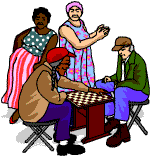How to Best Prepare for Old Age
Created | Updated Nov 26, 2008

The term 'grey pound' denotes the spending power of the nation's retired folk who, with relatively few outgoings and with no mortgage to pay, seem to be better off than the rest of us. Good for them. The twilight of your life should be a time of comfort and joy.
The aim of this entry is to provide you, the h2g2 Community, with the fundamental principles for making sure that your old age is a carefree, happy and healthy time.
The Essentials
How to Get a Good Pension or How to Invest Money
Investing in mutual funds, certificates of deposits and bonds outside of a company provided plan, is very important. A system of automatic savings helps. One of the best ideas is to pay yourself first. Put ten percent of your net paycheck directly into several stock and mutual funds. You won't miss that small amount taken out of each cheque. Start investing early in cash plans - not additional pension plans because you may find you have a sum of money that you need but can't touch.
Try to arrange for your policies etc to mature at different times. For example, ages 55 and 60 are good ages to receive a large chunk of cash to offset the fact that you may no longer have a wage coming in. If you have got it right you may be able to retire early and enjoy life - after all, no one wants to work forever.
How to Stay in Work if you Want To
In the United States, more and more people aged 65 and older are staying in the workforce. There are restrictions on how much they can earn without losing their Social Security (state pension) benefits. Not all of the semi-retired stay within their own industry. Many follow their avocations and start new careers on a part-time basis.
How to Make Sure You're in Good Health
You begin by living a lifestyle of moderation, starting as early in life as possible. Stay reasonably fit - and always look for new challenges and things to do.
How to Stay Happy and Busy and How to Establish an Active Social Life
Outside of work and family, establish friendships and hobbies. Be willing to grow and explore the world around you and be open to new ideas. Never stop learning.
How to Make Sure you've Got No (or few) Regrets
Be honest with yourself and others. Always try new things. Find what's good in your life and keep it; remove what isn't and don't look back.
Develop New Skills
The following, from one h2g2 Researcher, serves as an inspiration to us all.
I believe that old age begins when people settle into a rut and stop learning new things. Both the mind and body lose their agility when not given fresh challenges to master.
For the past decade, I've been making it a point to learn at least one new thing every year, and pursue it with passion. I try to do something different from the things I already know, so I can develop new ways of learning. Since I've always been a klutz, I've been focusing on developing grace and physical coordination through activities like darts, rollerblading, tennis, yoga and most recently belly dancing. Who knows what next year will bring...
And for my mind, I've been working on musical instruments (can successfully torture anyone with the accordion now), writing little stories, learning to colour with oil pastels, trying to master computer graphics, and generally making it a point to learn enough about new things to give me a bit of an understanding of them. I'm thinking my next project might be geometry, as I haven't messed with maths for 20 years.
I work really dilligently at these things until I reach a certain level of proficiency, then move on to the next project while still giving the old ones just enough attention to maintain them.
Another benefit is that once I finally have the time to spend doing what I please (quite a way off, still), I'll have begun plenty of hobbies that I can occupy myself with, rather than sitting in front of a TV, anticipating my next meal. And meanwhile, life is awfully interesting.
Memories
All of the above will provide you with the financial means, mental resources and personal projects that will furnish you with a fruitful old age. This little nugget from an h2g2 Researcher gives some invaluable advice that is both fun and can make your old age even more interesting to those around you.
You can do this (build up memories) by travelling, varying your job as much as is feasible, not living in the same house for 40 years, reading lots of different types of book, trying to meet new people as much as possible, and striving for a healthy balance between selfishness and philanthropy. In other words, try to develop memories that you want to remember. They'll be better companions to you in your old age than the TV.

